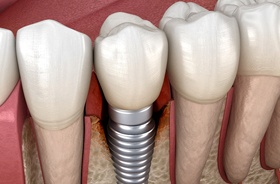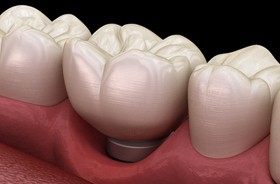
Dental Implant Failure & Salvage – Torrington, CT
Renewing Your Restored Smile
Dental implants are successful in more than 95% of cases, so you can rightly expect your new smile to stand the test of time. Rarely, though, a failed dental implant in Torrington can occur. Being able to recognize this problem and take prompt action is important. Below, you will learn about why dental implant failure can happen, which symptoms you should look out for, and how our team may be able to get your oral health back on track.
Why Do Dental Implants Fail?

Peri-implantitis, an infection around a dental implant, is the most common cause of implant failure. It occurs when bacteria invade the gums and bone, eating away at the tissue until the mouth is no longer able to support the implant. Missteps in oral hygiene are frequently the culprit behind peri-implantitis, but genetics and other factors can also contribute to it.
Other reasons why an implant might fail include:
- Failed osseointegration (the jawbone never forms a strong bond with the implant)
- Underlying health conditions, such as some types of cancer
- Physical injury, caused by an accident, teeth grinding, or other problems
Symptoms of Failed Dental Implants

Dental implants in Torrington have the potential to fail at any time. Early failure occurs soon after the initial placement surgery, while late failure can happen years or even decades later.
Here are some symptoms that you should always stay on the lookout for:
- Unusual or severe pain. Some discomfort is normal after dental implant surgery. However, severe pain as well as pain that occurs after you have fully healed are both red flags.
- Difficulty chewing. Once your new teeth are in place, it should be easy for you to eat most foods. Challenges in this area signal the need to visit your dentist.
- Signs of infection. Pus, red gums, receding gums, persistent bad breath, and swelling are signs of a potential infection and require professional care.
- A loose implant. In some cases, this is simply due to a loose restoration. In other cases, the implant itself is suffering.
How Dental Implant Salvage Works

It is important that you seek treatment as soon as you believe there is a problem with your dental implants. Delays will only allow things to get worse. The earlier you receive care, the more likely it is that we will be able to address the issue without extensive, expensive, or complex treatment.
When you arrive for your appointment, we will carefully examine your mouth to determine what is causing your symptoms. In some cases, we can stop an infection before it leads to total implant failure. You might need something as simple as antibiotic therapy or a few adjustments to your oral hygiene routine.
If the damage to the implant or the surrounding tissue is severe, we might have to remove the implant altogether. Then, after some restorative treatments, such as a bone graft, we might be able to insert a new implant a few months down the road.